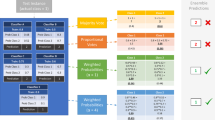Abstract
When there are multiple trained predictors, one may want to integrate them into one predictor. However, this is challenging if the performances of the trained predictors are unknown and labeled data for evaluating their performances are not given. In this paper, a method is described that uses unlabeled data to estimate the weight parameters needed to build an ensemble predictor integrating multiple trained component predictors. It is readily derived from a mathematical model of ensemble learning based on a generalized mixture of probability density functions and corresponding information divergence measures. Numerical experiments demonstrated that the performance of our method is much better than that of simple average-based ensemble learning, even when the assumption placed on the performances of the component predictors does not hold exactly.
Similar content being viewed by others
References
Amari, S.: Integration of stochastic models by minimizing α-divergence. Neural Comput. 19(10), 2780–2796 (2007)
Amari, S., Nagaoka, H.: Methods of Information Geometry. American Mathematical Society, Providence (2000)
Bennett, K.P., Demiriz, A., Maclin, R.: Exploiting unlabeled data in ensemble methods. In: Proceedings of the 8th ACM SIGKDD International Conference on Knowledge Discovery and Data Mining (KDD’02), pp. 289–296. Edmonton, Alberta, Canada (2002)
Breiman, L.: Bagging predictors. Mach. Learn. 24(2), 123–140 (1996)
d’Alché Buc, F., Grandvalet, Y., Ambroise, C.: Exploiting unlabeled data in ensemble methods. In: Proceedings of Neural Information Processing Systems: Natural and Synthetic (NIPS’01), pp. 553–560. Vancouver, BC, Canada (2001)
Chapelle, O., Schölkopf, B., Zien, A.: Semi-Supervised Learning. MIT Press, Cambridge (2006)
Cover, T.M., Thomas, J.A.: Elements of Information Theory. Wiley-Interscience, New York (1991)
Domingo, C., Watanabe, O.: Madaboost: A modification of adaboost. In: Proceedings of the 13th Annual Conference on Computational Learning Theory (COLT’00), pp. 180–189. Stanford, CA, USA (2000)
Freund, Y., Schapire, R.E.: A decision-theoretic generalization of on-line learning and an application to boosting. J. Comput. Syst. Sci. 55(1), 119–139 (1997)
Friedman, J., Hastie, T., Tibshirani, R.: Additive logistic regression: a statistical view of boosting. Ann. Stat. 28(2), 337–407 (2000)
Kullback, S.: Information Theory and Statistics. Wiley, New York (1959)
Mallapragada, P.K., Jin, R., Jain, A.K., Liu, Y.: Semiboost: boosting for semi-supervised learning. IEEE Trans. Pattern Anal. Mach. Intell. 31(11), 2000–2014 (2009)
Newman, D.J., Hettich, S., Blake, C.L., Merz, C.J.: UCI Repository of Machine Learning Databases (1998). http://www.ics.uci.edu/~mlearn/MLRepository.html
Roli, F.: Semi-supervised multiple classifier systems: background and research directions. In: Proceedings of the 6th International Workshop on Multiple Classifier Systems (MCS’05), pp. 1–11. Seaside, CA, USA (2005)
Schapire, R.E.: The strength of weak learnability. Mach. Learn. 5(2), 197–227 (1990)
Shanbhag, S., Wolf, T.: Accurate anomaly detection through parallelism. IEEE Netw. 23(1), 22–28 (2009)
Surowiecki, J.: The Wisdom of Crowds. Anchor Books, Warszawa (2005)
Uchida, M., Shioya, H.: A study on assignment of weight parameters in ensemble learning model. IEICE Trans. Inf. Syst., PT. 2 J86-D-II(7), 1131–1134 (2003). In Japanese
Uchida, M., Shioya, H., Da-te, T.: Analysis and extension of ensemble learning. IEICE Trans. Inf. Syst., PT. 2 J84-D-II(7), 1537–1542 (2001). In Japanese
Uchida, M., Maehara, Y., Shioya, H.: Design of an unsupervised weight parameter estimation method in ensemble learning. In: Proceedings of the 14th International Conference on Neural Information Processing (ICONIP 2007). Lecture Notes in Computer Science, vol. 4984, pp. 771–780. Springer, New York (2008)
Ueda, N., Nakano, R.: Generalization error of ensemble estimators. In: Proceedings of International Conference on Neural Networks 1996 (ICNN’96), vol. 3, pp. 90–95. Washington, D.C., WA, USA (1996)
Zhou, Z.H.: When semi-supervised learning meets ensemble learning. In: Proceedings of the 8th International Workshop on Multiple Classifier Systems (MCS’09), pp. 529–538. Reykjavik, Iceland (2009)
Zhu, X., Goldberg, A.B.: Introduction to Semi-Supervised Learning. Morgan and Claypool, San Rafael (2009)
Author information
Authors and Affiliations
Corresponding author
Additional information
A part of this paper appeared in the Post-Conference Proceedings of ICONIP 2007 [20]. This work was supported in part by the Japan Society for the Promotion of Science through a Grant-in-Aid for Scientific Research (S) (18100001).
Rights and permissions
About this article
Cite this article
Uchida, M., Maehara, Y. & Shioya, H. Unsupervised Weight Parameter Estimation Method for Ensemble Learning. J Math Model Algor 10, 307–322 (2011). https://doi.org/10.1007/s10852-011-9157-1
Received:
Accepted:
Published:
Issue Date:
DOI: https://doi.org/10.1007/s10852-011-9157-1




